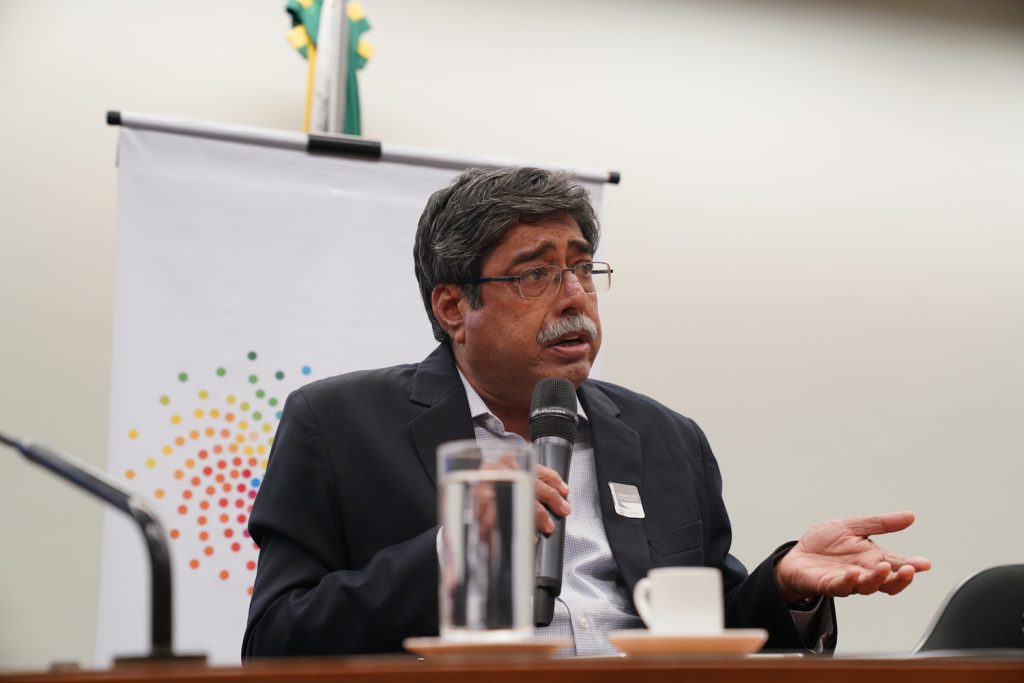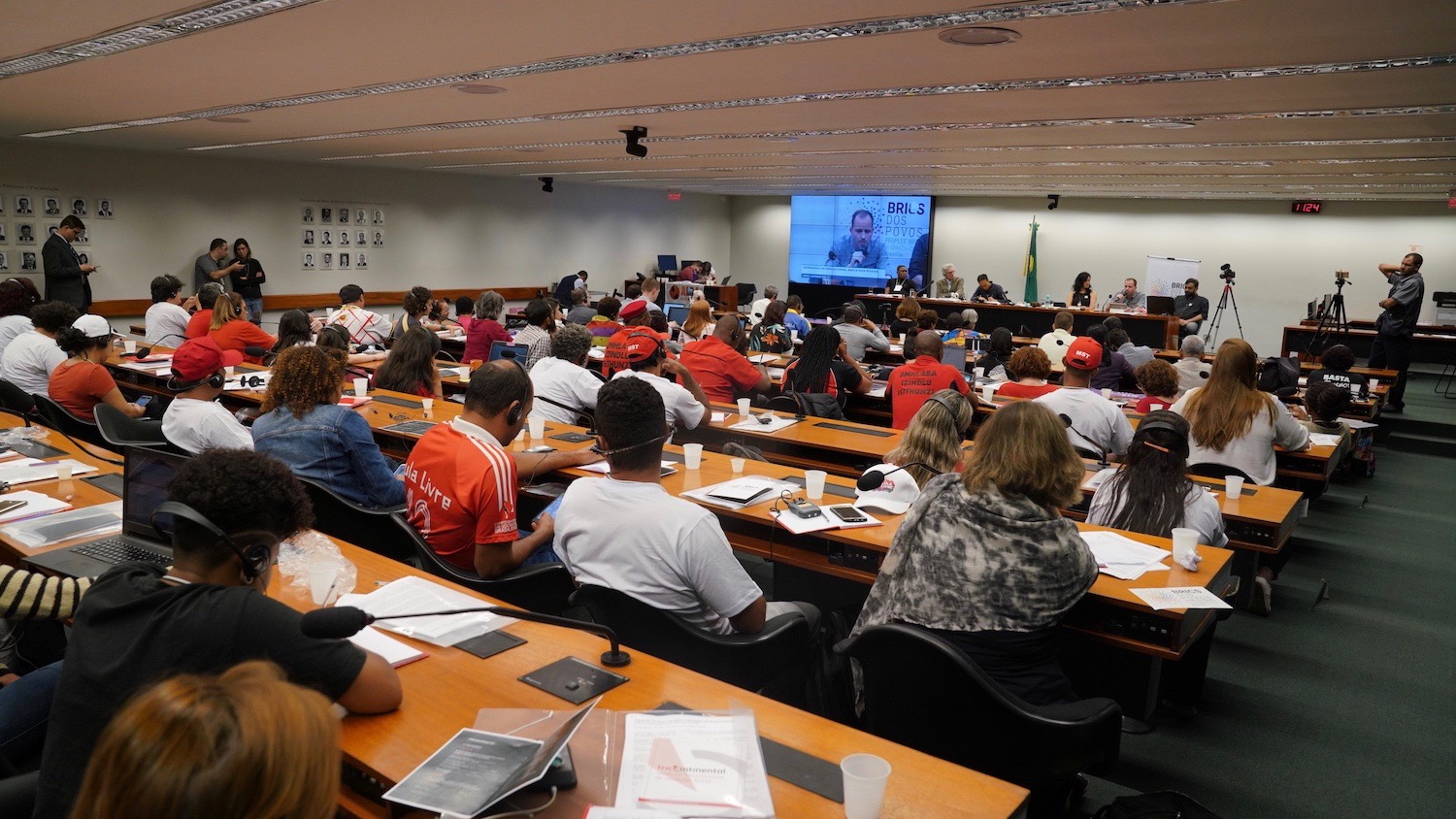The Peoples’ BRICS Seminar began on Monday November 11 in Brasilia, the capital of Brazil. It is being attended by over 150 representatives of people’s movements, political parties, trade unions, academics and journalists from Brazil, Russia, India, and South Africa. The seminar is occurring ahead of the official leaders’ summit that will begin in the city on November 13.
The driving focus of the Peoples’ BRICS Seminar is the unity and integration of the people not only of the BRICS countries but of all countries in the global south that face threats to their sovereignty and autonomy by the imperialist countries, right-wing governments and neoliberal policies.
Throughout the first day of discussions, panelists and participants denounced the civic-military coup d’état carried out against Evo Morales as a desperate attempt of the racist, conservative right-wing to stop the process of change in Bolivia and the region.
Imperialism
In the first panel titled “Imperialism, International Geopolitics, Role of BRICS and the People”, panelists addressed the distinct challenges that imperialism poses to these countries, in addition to the efforts of integration between them. The panelists from Brazil and India highlighted that the right-wing governments and right-wing movements in their countries have contributed not only to the exacerbation of misery and crisis for the working class and marginalized, but have caused a realignment of national interests in line with imperialism.
Paulo Nogueira Batista Junior, former vice president of the BRICS Development Bank, spoke in the first panel and criticized Brazil’s weak presence in BRICS, “While Brazil used to be a driving force of the BRICS, it became a relatively passive participant, with few initiatives and few ideas,” Batista Junior said. “This is actually happening with this current government, which is excessively, sometimes embarrassingly aligned with the United States, and that damages Brazil’s credibility.”
Monica Bruckmann of the Federal University of Rio de Janeiro and a specialist on China, highlighted the positive role China has played amid in the current geopolitical scenario of reconsolidation of right-wing forces. She explained how China’s economic growth and power has served as a counterweight to US global dominance and has opened up alternatives for the emerging economies of the global south.

Indian journalist Prasanth Radhakrishnan of Peoples Dispatch highlighted how the current capitalist crisis is highlighting the moral bankruptcy of imperialist nations: “Imperialism has been showing more and more that it is unable to present a project of control. More and more, imperialism shows that it believes it is ok to destroy a country and that is all it is capable of,” Radhakrishnan said, mentioning recent cases such as Libya, Iraq, and Afghanistan.
Trade union leader Mbuso Ngubane of the National Union of Metalworkers of South Africa added that the BRICS mechanism while important, maintains the logic of “capitalist accumulation” and in the current struggle against imperialism “we must take to the streets in every corner of this world. Unity between the working and peasant class is the only force capable of stopping the current, rapid march that can destroy us all.”

Russian journalist Konstantin Syomin reflected on the social component of the current global moment and identified the apathy and the “depoliticization of the masses,” as factors leading to social unrest. Though, he noted, this apathy will not last forever. He pointed out: “The contradictions are evolving fast within and between societies. What we are witnessing now is not a series of isolated cataclysms, but a profound crisis in the global capitalist system as a whole. ‘The world has changed, there is no proletariat anymore.’ How many times have we heard this? The world may seem different now, but the foundations of capitalism remain intact,” he said.
Capitalism in crisis
The afternoon session “Economic, Social and Environmental Crisis and Development Alternatives from the People” brought the crisis of neoliberal capitalism to the forefront. Brazilian economist from the University of Campinas Marcio Pochmann emphasized that the environmental impact of the current economic model and the culture of consumption of the elite classes is extremely grave and requires immediate attention.
Pochmann explained that “The productive, organizational process of work that we have seen in the last 200 years has been extremely compromising for the environment, as such that the continuity of this process is impossible. There is no way to sustain the pattern of consumption that the wealthy currently have
Indian economist Biswajit Dhar, of the Jawaharlal Nehru University, discussed the growth of inequality and poverty globally in the last several decades and the role of ‘development’ projects. He added that while wages have reduced, profit margins have increased.

With regards to economic challenges today, Dhar discussed the advancement of anti-labor legislation under the right-wing government and its impact on the working class. “India is changing its labor legislation to make it easier to fire workers. What is becoming very clear in India is that, because that wage share is dropping, the demand drops too, and many sectors are showing downward trends for this reason,” Dhar said.
Within the context of the crisis in the capitalist countries, Isabela Noguiera of the Federal University of Rio de Janeiro offered a perspective on the Chinese economic model which she described as “what was called state capitalism in the 1950s and 1960s,” with “lower inequality levels than the United States, as several measurements show.”
Nogueira said this is the case because China, for example, has mechanisms to control the financialization of its economy, which gives the country a relative autonomy.
Tomorrow the Peoples’ Summit will continue and participants will discuss political crisis and people’s struggles as well as the challenges of internationalism, solidarity and the integration of the peoples of the world. At midday, seminar participants will mobilize outside the Bolivian embassy in Brasilia in solidarity with the Bolivian people and to reject the coup.





